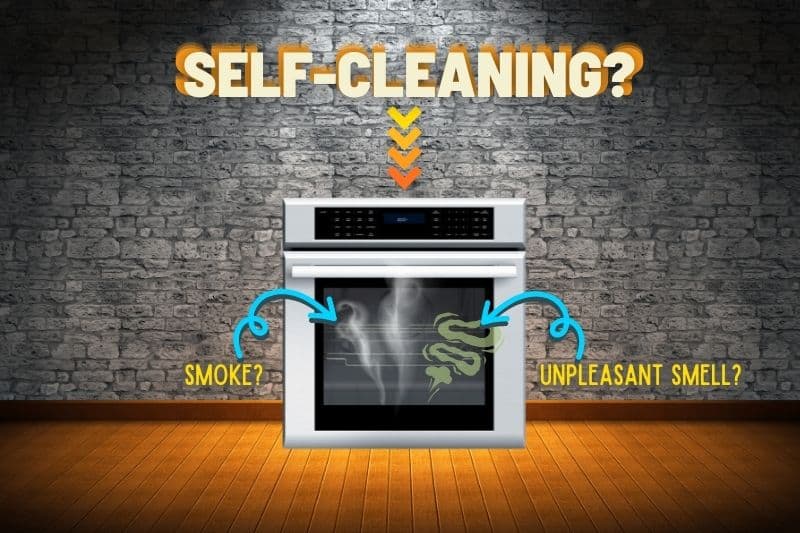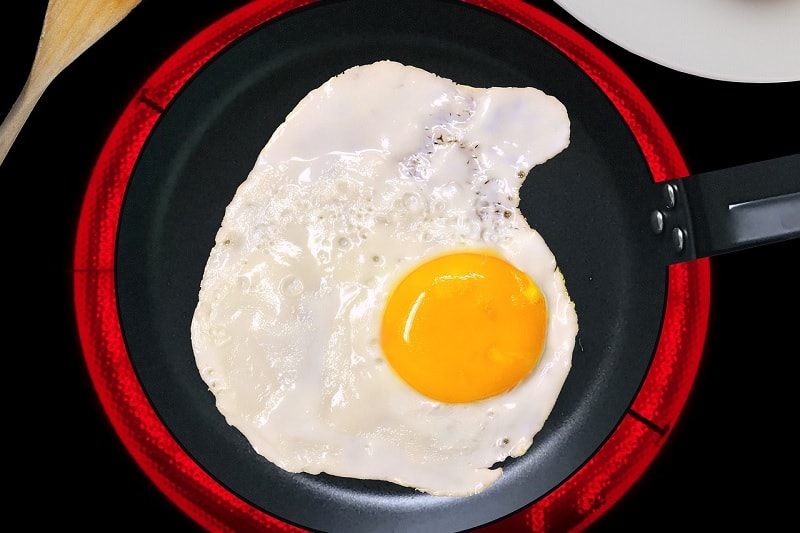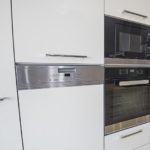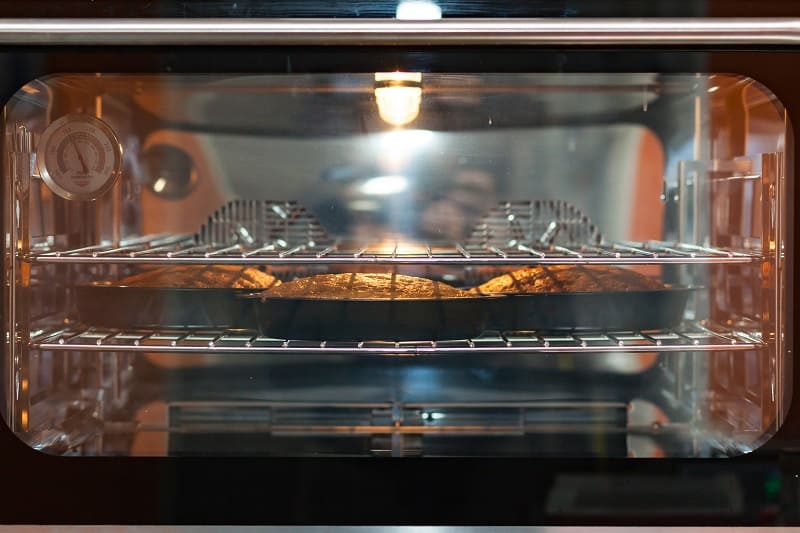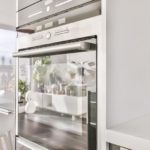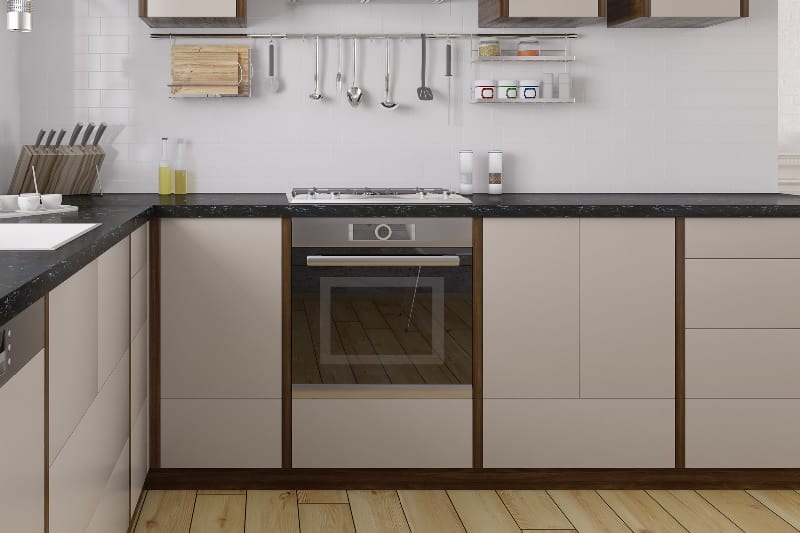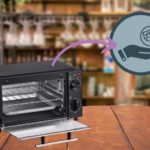Pyrolytic ovens are a type of self-cleaning oven. They use extreme heat to shift stubborn grease and debris from your oven’s interior, leaving it shiny and clean.
On the surface, a pyrolytic oven seems like an incredible addition to any modern kitchen. After all, cleaning the oven is one of the worst kitchen chores, so an appliance that takes this off your hand is welcome.
But you shouldn’t rush off and purchase a self-cleaning oven without knowing the disadvantages too.
Here we run through the pros and cons of pyrolytic ovens to help you decide whether it’s a good investment for your kitchen. Is it worth buying a pyrolytic oven? Let’s find out!
Pros of Pyrolytic Ovens
1. Convenience
The biggest advantage of pyrolytic ovens is convenience. These ovens take the hard work out of cleaning your oven by doing the job for you.
Doing so gives you time back into your day and means you never have to spend hours scrubbing away in your kitchen. Instead, your oven is cleaned after pressing a single button.
In their self-cleaning cycle, pyrolytic ovens heat up to more than 260ºC. These extreme temperatures are warm enough to burn away grease, dirt, and other baked-on debris.
By the end of the cleaning cycle, all these substances have turned to ash and can simply be vacuumed away. Your oven is shiny and new with minimal input and effort.
2. Avoiding nasty chemicals

Pyrolytic ovens clean themselves by using heat rather than strong and dangerous chemicals. This means you won’t have to handle any unhealthy cleaning products or breathe in the fumes as you clean your oven.
This has health benefits for everyone but is even more beneficial for people with allergies or asthma.
Cleaning with chemical products can also lead to skin irritation or sensitivities, which are too avoided by using the self-cleaning function on your pyrolytic oven. If you know you have sensitive skin, skip the cleaning products and consider getting a self-cleaning appliance.
3. Improved energy efficiency
Pyrolytic ovens are more energy-efficient than regular ovens. This is because the insulation inside the oven is much improved to enable to oven to reach the extremely high temperatures needed for cleaning without becoming a fire risk.
When used in their normal cooking mode, this means the oven retains heat more easily and requires less energy for cooking.
Cons of Pyrolytic Ovens
1. Some cleaning is still required
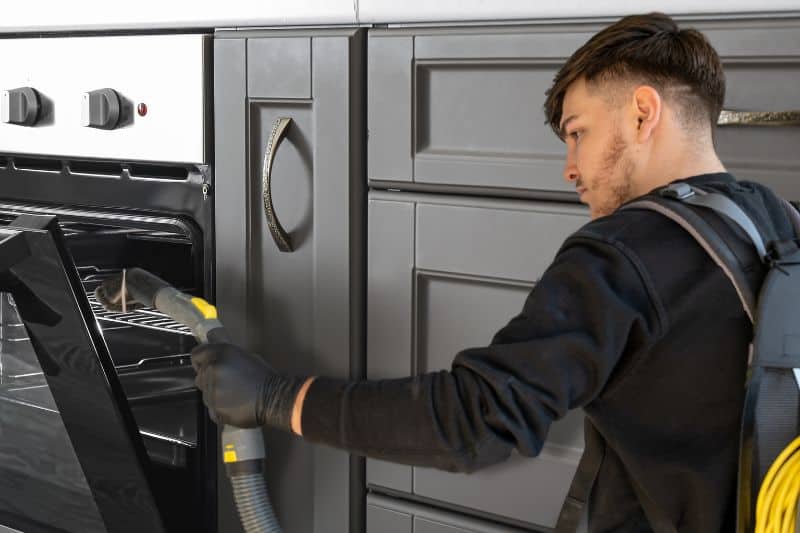
Although self-cleaning ovens make the job of cleaning ten times easier, you do still need to do some work.
After the cleaning cycle has finished, you need to vacuum the inside of your oven to clean away all the burnt ash and debris.
Moreover, you still need to keep your oven well maintained between cleaning cycles. This helps to ensure the self-cleaning feature works.
It is also important to remove any large bits of food stuck inside your oven before turning on the cleaning mode. If you don’t, these large bits of food will burn and turn to smoke which creates awful smells in your home.
2. Smoke, bad smells, and toxic fumes
As just mentioned, large bits of food left inside your oven are burnt during the cleaning cycle. In the process, an unpleasant burning smell is emitted that quickly travels around your home.
Your oven might be clean, but now your whole home has a horrible burning odour!
Toxic carbon monoxide is also released during the cleaning process, along with other toxic fumes such as polycyclic aromatic hydrocarbons and heterocyclic amines.
There is not enough research done into how much of these fumes are released, so it is difficult to quantify whether or not there is a health risk. As the risk is unquantifiable, it is up to you whether this is a risk you want to take.
Thankfully, you can reduce the risk substantially by opening the windows in your home when your pyrolytic oven is self-cleaning. This helps to improve ventilation so nasty smells, smoke, and toxic fumes don’t accumulate inside your home.
Cleaning away large bits of food before turning the cycle on will also limit the number of smells and gases released into your home.
3. Unsafe for children and pets
Pyrolytic ovens heat to upwards of 260ºC. Therefore, it isn’t recommended to use self-cleaning ovens around children or pets.
Although the oven is locked when self-cleaning, the extremely high temperatures can be hazardous. The outside of the oven can get hot, and your children or pets could risk getting burnt. Therefore, always supervise while the cleaning cycle is running.
4. Oven components can be damaged
Self-cleaning pyrolytic ovens are designed to withstand high temperatures. However, even with these temperature considerations made in the design process, the extreme heat can cause internal damage to your oven.
For example, the thermostat could be damaged so your oven heats incorrectly. Heat damage to wires or the melting of insulation around connectors could impair your oven’s function.
Thankfully, damages like this generally only happen if you are overusing the self-cleaning feature on your oven.
You should only need to run a cleaning cycle every four months. This is enough to keep your oven clean while protecting against damages and keeping energy bills down.
Is it Worth Buying a Pyrolytic Oven?
Whether or not it is worth purchasing a pyrolytic oven depends on your preferences. As you’ve learned from reading the pros and cons of pyrolytic ovens, these appliances do carry some risk in terms of health and safety.
However, most of these can be mitigated by opening windows, using the self-cleaning feature sparingly, and keeping your oven clean in between cycles.
With this in mind, self-cleaning ovens could be a great option for relatively tidy cooks. With less mess splattered everywhere, you won’t need to do much cleaning between cycles.
The emission of nasty odors and toxic fumes is reduced when your oven is cleaner in the first place, so you can reap the rewards without taking on added risk.
On the other hand, notoriously messy cooks probably wouldn’t benefit as much. The amount of cleaning needed in between cycles to ensure you are minimising the risks means it is unlikely to be worth it.
You’ll be spending so much time cleaning anyway, that you might as well invest in a quality regular oven and keep on top of the cleaning yourself.

Hannah is a freelance content writer and self-proclaimed foodie. When Hannah isn’t sitting tapping at her laptop, you’ll probably find her in the kitchen. As an ex-chalet host, she’s used to cooking four-course meals for 10+ people and loves feeding friends and family whenever possible.

